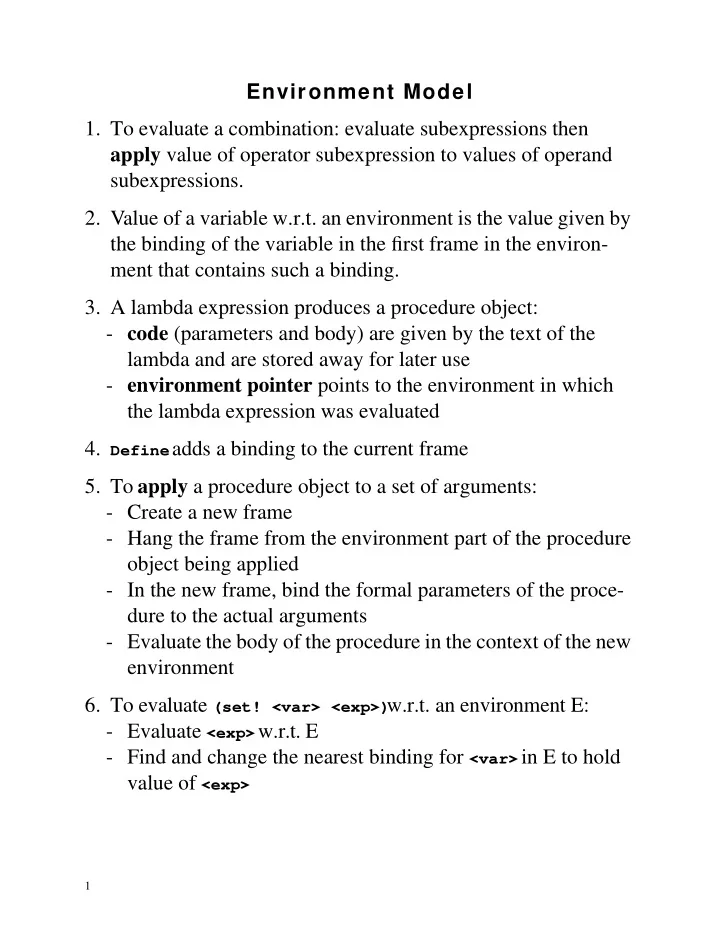

Environment Model 1. To evaluate a combination: evaluate subexpressions then apply value of operator subexpression to values of operand subexpressions. 2. Value of a variable w.r.t. an environment is the value given by the binding of the variable in the first frame in the environ- ment that contains such a binding. 3. A lambda expression produces a procedure object: - code (parameters and body) are given by the text of the lambda and are stored away for later use - environment pointer points to the environment in which the lambda expression was evaluated 4. Define adds a binding to the current frame 5. To apply a procedure object to a set of arguments: - Create a new frame - Hang the frame from the environment part of the procedure object being applied - In the new frame, bind the formal parameters of the proce- dure to the actual arguments - Evaluate the body of the procedure in the context of the new environment 6. To evaluate (set! <var> <exp>) w.r.t. an environment E: - Evaluate <exp> w.r.t. E - Find and change the nearest binding for <var> in E to hold value of <exp> 1
Use and Mis-Use of Set! ;; Functional programming style (define (factorial n) (define (iter product counter) (if (> counter n) product (iter (* counter product) (+ counter 1)))) (iter 1 1)) ;; Imperative programming style -- DEPRECATED (define (factorial n) (let ((product 1) (counter 1)) (define (iter) (if (> counter n) product (begin (set! product (* counter product)) (set! counter (+ counter 1)) (iter)))) (iter))) 2
;; Imperative programming style -- BUGGY! (define (factorial n) (let ((product 1) (counter 1)) (define (iter) (if (> counter n) product (begin (set! counter (+ counter 1)) (set! product (* counter product)) (iter)))) (iter))) 3
Implications of Mutation • Must worry about time and change : order of evaluation mat- ters! • Variables no longer stand for values - Become places whose contents may change • Must worry about identity : lose referential transparency • Natural for modeling objects/systems with state 4
Message-Passing Ship Implementation (define (make-ship x-pos y-pos time-left) (define (move dx dy) (set! x-pos (+ x-pos dx)) (set! y-pos (+ y-pos dy)) (list x-pos y-pos)) (define (count-down) (set! time-left (- time-left 1)) (if (<= time-left 0) ’blast-off time-left)) (define (dispatch message) (cond ((eq? message ’move) move) ((eq? message ’count-down) count-down) (else (error "No method" message)))) dispatch) (define enterprise (make-spaceship 0 0 10)) ((enterprise ’move) 1 2) ==> (1 2) 5
Data-Directed Ship Implementation (define (install-ship-package) ;; Internal representation (define (make-ship x y time) (list x y time)) ; Accessors (define (ship-x ship) (car ship)) (define (ship-y ship) (cadr ship)) ; Mutators (define (set-ship-x! ship new-x) (set-car! ship new-x)) (define (set-ship-y! ship new-y) (set-car! (cdr ship) new-y)) ; Operations (define (move ship dx dy) (set-ship-x! (+ (ship-x ship) dx)) (set-ship-y! (+ (ship-y ship) dy)) (list (ship-x ship) (ship-y ship))) ;; External representation - tagged object (define (tag x) (attach-tag ’spaceship x)) (put ’make ’spaceship (lambda (x y t) (tag (make-ship x y t)))) (put ’move ’spaceship (lambda (s dx dy) (tag (move s dx dy)))) ’done ) (define (move obj dx dy) (apply-generic ’move obj dx dy) 6
Recommend
More recommend